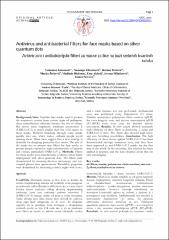| dc.contributor.author | Jokanović, Vukoman | |
| dc.contributor.author | Zdravković, Nemanja | |
| dc.contributor.author | Petrović, Božana | |
| dc.contributor.author | Živković, Marija | |
| dc.contributor.author | Biočanin, Vladimir | |
| dc.contributor.author | Aleksić, Ema | |
| dc.contributor.author | Milutinović, Jovana | |
| dc.contributor.author | Petrović, Tamaš | |
| dc.date.accessioned | 2024-05-30T08:31:41Z | |
| dc.date.available | 2024-05-30T08:31:41Z | |
| dc.date.issued | 2024 | |
| dc.identifier.issn | 2406-0720 | |
| dc.identifier.uri | https://repo.niv.ns.ac.rs/xmlui/handle/123456789/820 | |
| dc.description.abstract | Background/Aim. Available face masks, used to protect
the respiratory system from various types of pathogens,
show unsatisfactory efficiency because the size of viruses
like severe acute respiratory syndrome coronavirus 2
(SARS-CoV-2) is much smaller than the void spaces in
these masks. Difficult breathing through some masks
quickly tires out, which makes ordinary people avoid
wearing them. These facts suggest that a new strategy is
desirable for designing protective face masks. The aim of
the study was to present new filters for face masks to
protect people exposed to high concentrations of bacteria
and viruses, particularly SARS-CoV-2. Methods. Filters
for these masks were manufactured of dense cotton fabric
impregnated with silver quantum dots. The filters were
characterized by scanning electron microscopy and ioncoupled
plasma mass spectrometry. Wettability properties
were determined by measuring contact angles with water,
and a color fastness test was performed. Antibacterial
assay was performed using Staphylococcus (S.) aureus.
Viability quantitative polymerase chain reaction (qPCR)
for virus integrity assay and reverse transcription qPCR
(RT-qPCR) assay were used for antiviral activity
assessment. Results. In vitro assays showed extremely
high efficiency of these filters in destroying S. aureus and
SARS-CoV-2 virus. The filters also showed high safety
and easy breathing possibilities. Conclusion. The high
efficiency of these masks against SARS-CoV-2 has been
demonstrated through numerous tests, and they have
been approved as anti-SARS-CoV-2 masks for the first
time in the world. In the meantime, this solution has been
applied in practice, and the data obtained about that are
very encouraging. | en_US |
| dc.description.sponsorship | The research was funded by the Ministry of Science, Technological Development and Innovation of the Republic of Serbia (No. 451-03-47/2023-01/200017). | en_US |
| dc.language.iso | en | en_US |
| dc.source | Vojnosanitetski Pregled | en_US |
| dc.subject | air filters | en_US |
| dc.subject | masks | en_US |
| dc.subject | polymerase chain reaction | en_US |
| dc.subject | sars-cov- 2 | en_US |
| dc.subject | silver | en_US |
| dc.subject | staphylococcus aureus | en_US |
| dc.title | Antivirus and antibacterial filters for face masks based on silver quantum dots | en_US |
| dc.title.alternative | Antivirusni i antibakterijski filteri za maske za lice na bazi srebrnih kvantnih tačaka | en_US |
| dc.type | Article | en_US |
| dc.identifier.doi | 10.2298/VSP230922025J | |
| dc.citation.rank | M23 | en_US |
| dc.type.version | published | en_US |

